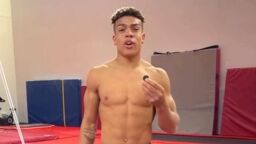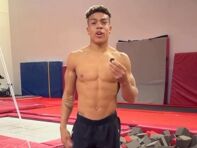NORMAN, Oklahoma — The Oklahoma men’s gymnastics coaches pointed out the university’s Gender and Equality Center during Eric Holley’s recruiting trip.
The OU coaches knew they were recruiting a gay athlete when they pursued Holley and offered him scholarship money.
Holley redshirted his freshman year and saw Oklahoma win its second consecutive national title in 2016.
The Sooners returned 73% of their lineup from the 2016 NCAA Championships, and the team had three freshmen coming in for the 2017 season.

Oklahoma made no scholarship commitment to Holley for his sophomore year, so when a poorly timed bout of mononucleosis hit him before tryouts his sophomore year, it led to bad news.
Holley was cut from the Oklahoma men’s gymnastics team.
“I went down on the club team, and I reevaluated my gymnastics and figured out what I wanted to do,” Holley said.
Being cut was Holley’s most recent obstacle. To get to Oklahoma, he persevered through personal and athletic adversity, and he wasn’t going to let this setback stop his dream of competing for the Sooners.
To overcome being cut, he dominated at the club level his sophomore year and returned to the Oklahoma varsity team this season. The 5-foot-6, 138-pound Holley contributed throughout the season on vault and floor.
He will travel with the No. 1-ranked Sooners to this weekend’s NCAA Men’s Gymnastics Championships in Chicago. He’ll learn if he gets to compete when the team arrives.
“I’m working really hard right now, and hopefully, I can gain a spot in one of those lineups,” Holley said. “If not, my goal is to support my team and to play my part in kind of the end goal, which is to win a national championship.”
Struggle
Getting his first cellphone that could text was supposed to be exciting for Eric Holley, who grew up in Salt Lake City and was raised Catholic.
Within a week of getting the phone, it turned into a device that tormented him from his pocket.
“Eric Holley is gay. That’s not OK.”
“He kisses boys.”
“You’re going to go to hell.”
Those were the tame text messages sent anonymously to Holley. He didn’t want to repeat the vulgar messages he received.
This started when he was 13. Holley had yet to come out to himself as gay when he started receiving these messages. They were based on his mannerism, voice and slight stature.
He received messages from as many as 12 phone numbers, and he continued to receive the messages through his freshman year of high school.
“That really … scared me at the time,” Holley said. “That was probably the hardest time of my life as far as being OK with my sexuality and being OK with who I was.”
He talked with his parents about changing schools, but he decided to stay. Holley went through that for at least two years before the messages dissipated.

A pansexual role model
Around his freshman at Woods Cross High School, he started to see guys differently. He started searching the internet to learn about homosexuality — Was it a mental disorder? Was it hereditary?
“I finally got to the point — maybe I need to reconsider what I like and what I’m interested in,” Holley said.
Holley describes himself as a “huge Ellen fan,” and he says watching “The Ellen DeGeneres Show” made him feel OK with being gay.
But getting a new gymnastics coach is what helped him feel comfortable coming out to people. Gabe Conner, who identifies as pansexual, became Holley’s club gymnastics coach around Holley’s sophomore year of high school.
Conner didn’t hide his sexuality from his gymnasts, and Holley saw Conner accepted by the gymnasts. It gave Holley the confidence to come out to his club teammates.
He started with his best friend, Dylan Ellsworth, now a men’s gymnast at the University of Iowa, but it wasn’t easy.
“I knew that he was completely fine with it, but I was so scared,” Holley said of telling Ellsworth. “What if it’s different because it’s me? We had had sleepovers since we were little. We had gone swimming together. What if this totally changes all of that?”
Holley found the words to tell Ellsworth one day when they were doing drills in the gym. The only change was for the better.
“I could finally talk to him about … everything that I felt like I had been holding in for as long as I had known him,” Holley said. “He was just so cool to talk to about it. He wanted to know everything. I was just really excited to be able to get to tell someone about all of that and just be completely transparent.”
Holley told the rest of his club gymnastics teammates shortly after Ellsworth, and Holley didn’t wait long to tell his parents either.
His mom’s reaction is one of Holley’s favorites that he received.
“We knew from the time you were like 2 years old,” Tracey Holley said when Eric came out. “You were dancing to Britney Spears in your underwear. You were way too fabulous to be straight.”
On to Oklahoma
Holley had not signed a scholarship when he started the gymnastics season for his senior year of high school.
He had several schools interested until a vault landing went wrong in late February 2014.
Holley planned to try a Yurchenko double full for the first time in a competition, but he didn’t make it to competition.
The fibula in his left leg snapped during the vault warmup.
The colleges pursuing Holley scurried away at the news he’d be in a boot for more than two months.
Facing the end of high school with no college scholarship offers, Holley decided to take a gap year.
“Probably the best decision that I ever made,” Holley said.
Oklahoma hadn’t recruited Holley originally, but in the fall of his gap year, they asked him to come on a recruiting visit. He couldn’t say no to the reigning national champions.
During his recruiting visit, the LGBTQ programs that Oklahoma’s coaches talked about and the university’s strong health and exercise science program had Holley impressed even ahead of touring the athletics facilities.
“Before I had even watched them practice, I was already pretty much sold,” said Holley, who signed his National Letter of Intent on Nov. 12, 2014.

He arrived in Norman, Oklahoma, in the summer of 2015. He was roommates with fellow freshman Levi Anderson.
In one of their first conversations their first day, Holley came out as gay to Anderson. Holley expected the worst, but Anderson surprised him by saying one of his best friends is gay.
“That was very comforting to me,” Holley said. “I feel like immediately he treated me like family. And still to this day, we are so close.”
Anderson said that he was actually worried about Holley being comfortable with him after their conversation. Anderson had seen his high school friend feel awkward around him after coming out.
But that night, Anderson’s worries about Holley went away.
While Anderson laid on his bed on top of the blankets watching TV, Holley jumped on the bed and laid next to him to watch TV and start talking.
“OK, we are cool,” Anderson remembers thinking.
Holley redshirted his freshman season. Ahead of the next season, Holley was cut from the Oklahoma varsity team. Holley didn’t talk much about being cut, according to Anderson.
“I know him well enough to know that he definitely was upset about it,” Anderson said.
Anderson said Holley excelled at the club level last season to ensure he returned to the Sooners varsity team in 2018.
“I’m someone who is very, very calm and positive. I don’t ever get super, super frustrated,” Holley said. “That’s probably something that helps me a lot. … I can really, really take all of that, and even though I’m probably pissed inside, I kind of put that into a box and let that drive me.”
Oklahoma debut
On Jan. 27 in Ann Arbor, Michigan, Holley wore the interlocking OU on his chest for the first time in a varsity competition.
He scored 11.65 points on floor as Oklahoma beat Michigan 411.65-403.65. The win marked the 77th consecutive win for the Sooners — a streak now up to 87 straight wins entering the national championships.
Holley competed in four of Oklahoma’s meets so far this season. He most recently competed in a March 10 home meet against California, and he was in the lineup for vault and floor. Holley came in fourth for the Sooners in both events that meet.
“Just still being in it and still going strong right now is probably my biggest accomplishment,” Holley said of his greatest gymnastics success. “I’m happy. I’m healthy. I’m doing what I love.”

And his teammates love having him back on the team this season.
“When I’m in the locker room and having a horrible day, he’ll be like, ‘You look cute, man,’ ” Anderson said. “Coming from him, you just kind of laugh about it. You’re like, ‘Well, now that he says that, that does make me feel good. If he thinks I’m cute, there’s got to be someone else out there thinking I’m cute.’
“It’s the little things like that I think he brings,” Anderson added. “He honestly brings leadership with his ability to be comfortable with who he is.”
Holley has two years of eligibility remaining after this season, and he plans to make the most of it.
“I definitely am very happy where I’m at,” Holley said. “Sometimes gymnasts or other athletes, they may feel a little bit of — what if I had gone to this program, maybe I could have done this better. I haven’t had a single regret since I came here. I have loved every second of it, and I feel like it’s going by way too fast.”
Eric Holley, 22, is a redshirt sophomore on the Oklahoma men’s gymnastics team. He can be reached on Instagram @EricMichaelHolley.
Erik Hall is a member of the Associated Press Sports Editors and the National Lesbian and Gay Journalists Association. He can be reached on Facebook, Twitter @HallErik or by email at [email protected].







































